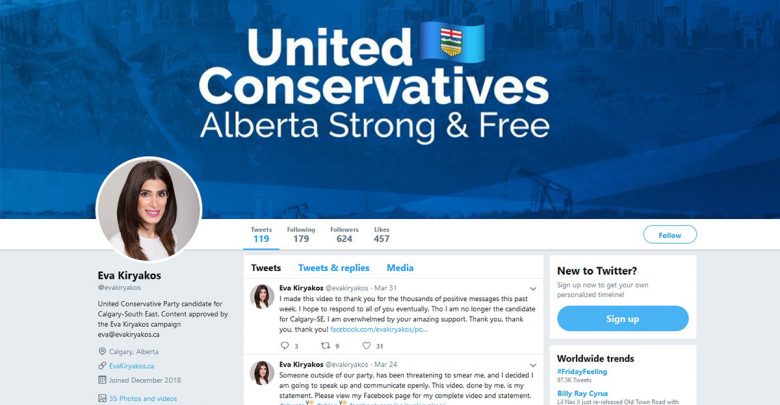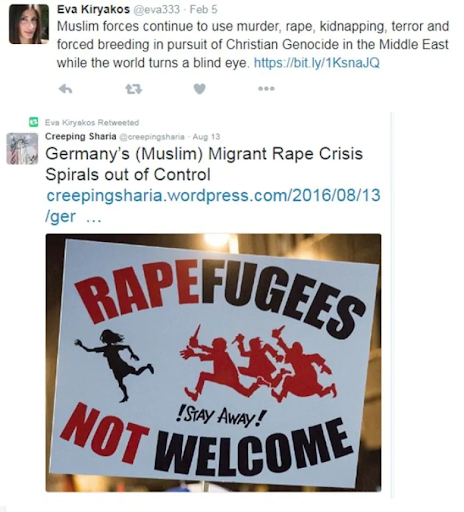 Richard Bagan
Richard BaganTweets former UCP candidate Eva Kiryakos composed prior to her candidacy — regarding such things as tired, transphobic rhetoric on the trans bathroom debate and what she terms a “migrant rape crisis” — have come back to haunt her.
Kiryakos announced that she would be dropping out of the electoral race via a video posted to her Facebook account, claiming a “bully” was threatening to reveal her highly-problematic tweets to the public. In the video, she acknowledged the majority of her controversial tweets, defending them in a tirade on what she feels is her being vilified for her “beliefs and values.” She claims her dropping out of the election is an altruistic move, so as to not draw (anymore) negative attention to the UCP.
Saying that one can be blackmailed with content they themselves posted on social media (especially content posted on non-private accounts) is oxymoronic. The content Kiryakos claims to have been blackmailed with could have been found by anyone should they have scrolled far enough back on her Twitter feed; they are opinions she felt confident to share publicly prior to running for office. Kiryakos’ dropping out shows that she knows her tweeted statements are in the least morally reprehensible.
But there is still a disconnect in her logic. She’s aware of the attention her “beliefs and values” warrant will result in negative attention for the UCP, but still cannot determine why the reception to said values would be so overwhelmingly negative.
Among the more repugnant of her tweeted values is a belief in a “Muslim pursuit of Christian genocide in Germany.” She’s also retweeted an anti-refugee propaganda poster:

Another of Kiryakos’ especially bigoted tweets (that she’s since had the good sense to delete) is one expressing her belief that the purpose of gay straight alliances convert children to presumably homosexuality. This is an especially horrid thing to tweet, given Alberta’s shameful history with the still-legal practice of conversion therapy.

We can, in the least, take solace in the fact that Kiryakos has dropped out of the election. The entire situation, though, raises interesting questions around digital transparency. It seems to be something of a double-edged sword; for instance, it can allow citizens the chance to see an unfiltered side of electoral candidates that was once reserved for friends and family; though if you happen to be an electoral candidate, digital transparency is likely not your friend.
Can one legitimately be blackmailed with something they posted on a public social media account? Decades-old interviews are often circulated by political parties to defame their opponents during elections, so how is simply pointing out something one publicly wrote in the recent past any different from a moral standpoint? I for one, feel adamantly that voters have a right to know any information a candidate makes public, regardless of when that information was released. Kiryakos wasn’t bullied. She is a bully. She used Twitter to spew hate, and she needed to be held accountable.




